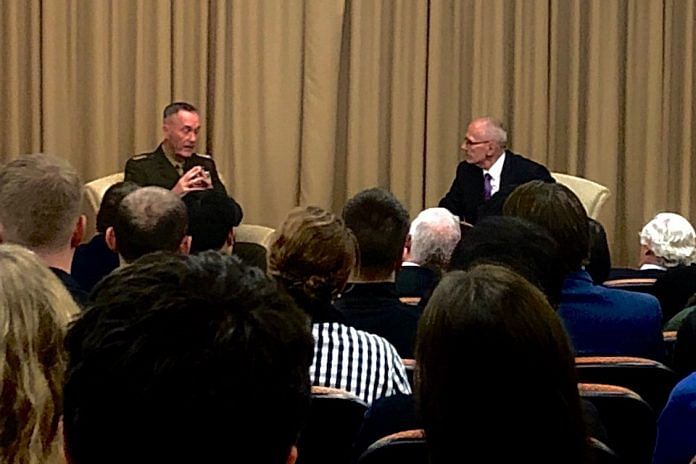Joseph Dunford, chairman of the US Joint Chiefs of Staff, engaged with the academia recenlty, and addressed topics like North Korea, cyber security & space.
General Joseph Dunford, chairman of the Joint Chiefs of Staff of the US Armed Forces, was recently given a second term by the Senate under the Trump administration. Appointed in 2015 by the Obama administration, his continuation in the chair is testimony to his apolitical and bipartisan approach to advising the President as the highest ranking military officer in the country.
Speaking recently at the Fletcher School of International Law and Diplomacy at Tufts University in Massachusetts, from where he earned a Masters in International Relations as a young army major, in addition to one from Georgetown University in government, Gen. Dunford reflected on the important role that US academia had played in developing senior military leadership.
Clearly on a mission to engage with students, academia and people at large after the recent controversy over the lack of transparency regarding details of the ambush of a US patrol in Niger during a Peacekeeping Mission, Dunford highlighted the various security challenges that the US and the world at large faced. Candid, witty and extremely well-informed, he repeatedly emphasised that for the US military to remain the most powerful and credible force in the world, its leadership must remain apolitical, and seen by the political leadership as being credible, trustworthy, and committed to protecting America’s national interests and core values.
It was refreshing to see the ease with which he answered a host of questions that ranged from predictable ones like the North Korea imbroglio and China, to cyber security, space, global terrorism, and the growing Indo-US strategic partnership.
This writer was present at the talk, and counted about 20 questions that Dunford answered – and it wasn’t the General who ran out of patience, it was the audience that ran out of questions.
An interesting facet of General Dunford’s outreach visit to Boston was not only his engagement with academia, but also a session with a niche group of technology enthusiasts to explore ideas for the future, and reduce the time from idea germination to product development.
The India question
Quizzed by this writer about the trajectory of the security dimension of the Indo-US strategic partnership, particularly in the light of the robust military engagement that had taken place under his watch as chairman of the Joint Chiefs of Staff, Dunford was cautiously upbeat. Unlike many impatient US analysts who criticise India for its overly-cautious approach in taking the relationship forward, Dunford recognised that historical inconsistencies and political compulsions, particularly in India, dictate the pace at which the US-India relationship is growing.
The bottom line, however, as pointed out by strategic thinker Brahma Chellaney recently, is that the US has engaged in more military exercises in the recent past with India than it has with any of its major allies. When one benchmarks this with recent statements made by PM Modi and President Trump on building strong militaries, it is only natural to assess that operational synergy between the two militaries is bound to gather momentum in the years ahead.
Asked what the most significant takeaways from his academic sabbaticals were, Dunford listed critical thinking, the ability to emerge from an operational cocoon and absorb diverse world-views from fellow students and faculty, and the ability to communicate in multiple mediums.
Following in Mattis’s footsteps
A review of General Dunford’s bio reveals at least three years spent in higher education — one at the Army War College, and two at top civilian schools dealing with politics and diplomacy. Another interesting vignette that emerged during the discussion was that Secretary of Defence James Mattis, under whom Gen. Dunford has served five times, is known to have embarked on a ‘self-study mission’ decades ago, and built a reputation of great intellectual rigour and depth beneath his hard-driving ‘Mad Dog’ reputation.
Readers would be interested to know that before he took over as Secretary of Defence, General Mattis was a Distinguished Visiting Fellow at Stanford’s Hoover Institution for almost three years.
I often hear arguments about what the limits of articulation from the military ought to be, and condescending views from the media and academia on the intellectual capacity and inclination of senior military leadership in India. To this, I will only say that the changing nature of conflict and ‘full spectrum roles’ assigned to the Indian military dictate that its leadership be empowered intellectually to perform its tasks better, in pursuit of core national interests.
Arjun Subramaniam is a retired Air Vice Marshal of the Indian Air Force, and is currently a Visiting Fellow at The Harvard Asia Center. He will soon be a Visiting Fellow at ‘The Changing Character of War Programme’ at Oxford University, and is a contributing editor at ThePrint.



